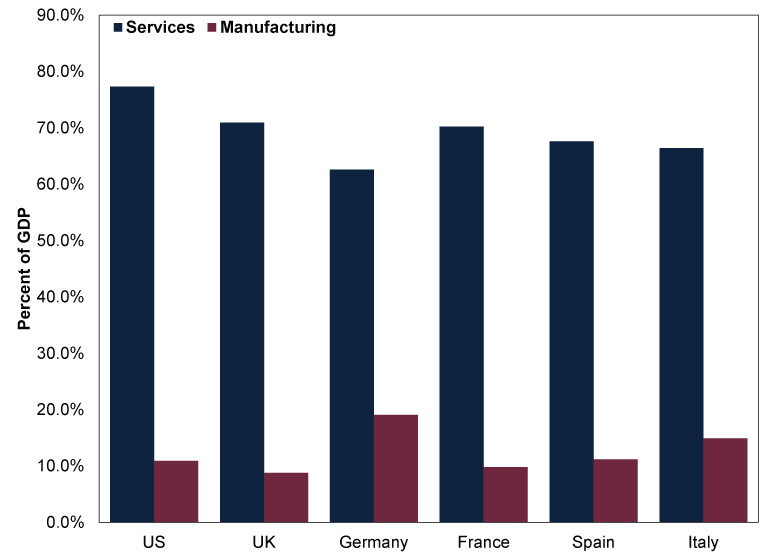Personal Wealth Management / Economics
PMIs, Supply Hiccups and Shares
July Manufacturing purchasing managers’ indexes confirm what shares already knew, in our view.
Is the party ending? That is the question many financial commentators we follow asked as manufacturing purchasing managers’ indexes (PMIs) rolled in Monday. These monthly business surveys showed continued growth on both sides of the Atlantic, with some nations even accelerating modestly. But they also showed the strain of severe supply shortages, and we have seen some experts warn the economic recoveries from lockdowns are about to hit a harsh speedbump—particularly in Britain and manufacturing powerhouse Germany. We do think it is fair to presume businesses will have problems fulfilling orders in the near future, and that will weigh on output. But derailing the recovery seems a stretch, and markets have already signaled as much, in our view.
Overall, July PMIs were strong. As Exhibit 1 shows, the headline results clustered around 60—well above 50, the line between growth and contraction (according to the surveys’ methodology). New orders also grew at a fast clip, based on the commentary in IHS Markit’s press releases. Our research shows that is ordinarily a great sign for near-term economic growth, as today’s orders are tomorrow’s production. But these days, rip-roaring new orders can be a headache for businesses. Supplier delivery times are on par with lockdown-era disruptions, complicating manufacturers’ ability to keep up with demand. The PMIs demonstrated that many are hoarding resources and components, fearing even greater supply disruptions later, and instead fulfilling orders by drawing down stockpiles of finished goods. Even so, order backlogs are growing at or near record rates in most major nations—a sign demand is outpacing manufacturers’ production capacity.
Exhibit 1: Dissecting July’s PMIs

Source: FactSet, ISM and IHS Markit, as of 2/8/2021. Quotes pulled from official press releases.
In some respects, this all falls into the nice problem to have category, in our view. Even if factories can’t meet it right away, high demand is generally a hallmark of a strong economy. Plus, we don’t think supply chains will be this stressed forever. Experts quoted in recent financial news coverage anticipate a lot of the kinks will be evened out by yearend.[i] New semiconductor foundries will take longer to come on line based on the traditional construction timelines, but industry coverage suggests producers are basically running 24/7 to raise output in the meantime. China’s COVID containment policies do add a wildcard, as they can trigger port closures without warning, but those setbacks have thus far been fleeting, based on our analysis of the situation. Most important, in our view, is that equities have been dealing with all of these issues for months now. PMIs seemingly confirm what shares already knew—and priced in. As we have noted before, equities likely didn’t anticipate a perfectly smooth reopening since society overall anticipated setbacks—and this seems like just another facet of that.
As for the broader recoveries, we encourage readers not to overrate manufacturing’s influence. As Exhibit 2 shows, services—not manufacturing—comprises the lion’s share of major Western economies. Even in Germany, with its supposedly huge industrial sector and excessive vulnerability on this front.
Exhibit 2: Services Is Bigger Than Manufacturing

Source: World Bank, as of 2/8/2021. Services and Manufacturing Gross Value Added as Percentages of gross domestic product in 2019, to avoid pandemic-related skew. World Bank figures may differ from national statistics agencies due to differing methodology. Gross domestic product, or GDP, is a government-produced measure of economic output.
Our research shows services firms are much more insulated from shortages of semiconductors, lumber, industrial metals and all the rest. Retailers are logically worried about holiday inventory not getting here in time, but that was also supposedly going to be an issue last year.[ii] Fear proved overwrought then, and society is overall much more adept at living with the virus now than it was then. So, we think it seems unlikely that retailers can’t count on Father Christmas to get presents where they need to go again this year.
In our view, the most meaningful takeaway from manufacturing PMIs probably has to do with investor sentiment. Based on our assessment of coverage presenting these reports, runaway optimism hasn’t set in. If sentiment now were broadly euphoric, our experience suggests financial commentators would be hyping those high headline results and robust new orders, not casting supplier delivery times as a big threat to growth. As long as experts can still dwell on the negatives now and then, our research suggests it is a sign irrational exuberance is at bay—a positive sign investor expectations aren’t stretched to unattainable levels.
Get a weekly roundup of our market insights.
Sign up for our weekly e-mail newsletter.

See Our Investment Guides
The world of investing can seem like a giant maze. Fisher Investments UK has developed several informational and educational guides tackling a variety of investing topics.




